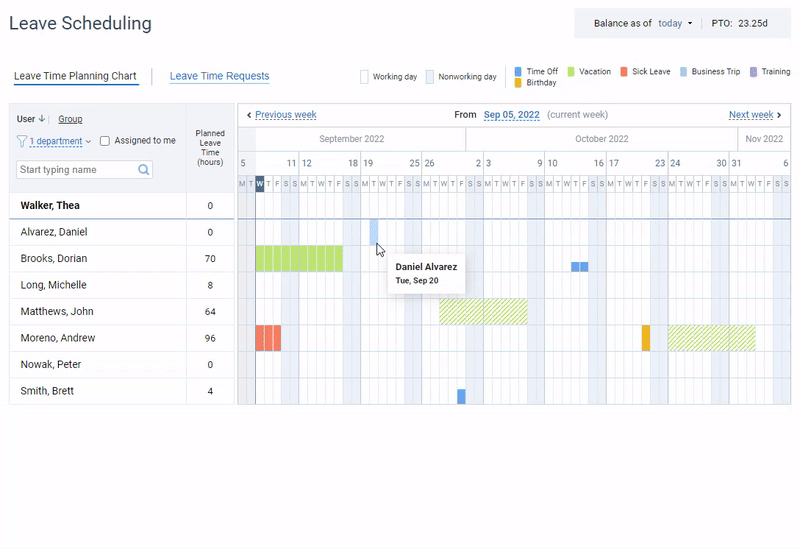According to recent studies, up to 6% of American hourly workers arrive late to work and about 25% of employees come to work late from time to time. Employee tardiness costs businesses hundreds of thousands in payroll expenses and lost profits, team performance and staff morale, so it’s important that HR teams and managers understand the reasons and know ways to prevent and deal with tardiness.
Get a handle on employee tardiness before it costs your business a fortune in money and human capital. Read on to learn the importance of preventing tardiness, reasons why employees come late for work and ways to deal with tardy employees effectively.

Consequences of Employee Tardiness
Assuming that a standard working day is eight hours a day, five-minute tardiness doesn’t seem like a big deal. Let us prove you wrong.
Let’s take an average salary in the US which equals approximately $990, meaning an average employee makes about $6 per hour. An employee who is always 5-min late for work robs their company of 21 working hours every year, which costs businesses about $126, not taking into account the associated profits lost due to their absence at the workplace.
So, an employee who is chronically 10-minutes late, will be absent for 42 working hours per year, which equals a week of paid vacation time!
The bad news is that business consequences are not limited to absence time and associated costs. Let’s see what other risks and consequences tardy employees bring.
Resentment and lowered morale
If any employees are consistently late for work, those who show up at work on time may start to feel resentful. More than that, if they have to compensate for tardy employees, add frustration and lowered morale to the equation, which will affect discipline and productivity. And once your team develops this mindset, it will take time and effort to get things back to normal.
Loss of respect and discipline
If an employee consistently gets away with their tardiness, others are likely to lose respect for their manager and adopt this bad habit themselves as they believe that no repercussions will follow. This lack of discipline is very likely to affect other areas of work and responsibilities undermining quality of work, productivity and other processes.
5 Reasons Why Employees Are Late for Work
Employees may give different, even bizarre excuses for not showing up at work on time. But we’d like to dwell on the 5 most common reasons why employees can become chronically tardy that every manager should be aware of.
1. Low motivation
One of the top reasons why some of your employees are late for work is that they are no longer motivated to do their job. These employees may have one of the four reasons to lose motivation: they see no personal value in their work, they feel overwhelmed by a difficult task or their whole workload, they struggle with negative emotions (anxiety, stress, depression) or they can’t identify the real reason.
2. Unhappiness about the job
This reason is one the most likely next phases after low motivation that hasn’t been dealt with. After an employee becomes indifferent about their job, they no longer care about any repercussions that may follow for them arriving late and chances are they are looking for a new job. It is not the simplest thing to fix, so you should look for early signs of declining motivation and performance and investigate these as early as possible.
3. Tiredness and exhaustion
If employees have poor work-life or work-rest balance, they tend to experience fatigue and decline in concentration and focus. If you notice employees who drag themselves into the office, look exhausted day after day and sit half asleep at the meetings, their batteries are extremely low. If you don’t confront the employee about their condition early on, it may result in an extensive sick leave.
4. Stress, depression or burnout
Unclear job expectations, toxic workplace environment, work-life imbalance and personal issues can cause stress and even job burnout. Learn to recognize symptoms of burnout and depression and have a conversation with an employee as soon as possible whenever you notice them struggling with mental health before it gets serious.
5. Personal issues
Sometimes life outside of work becomes so overwhelming for employees that they develop a pattern of arriving late for work. They may feel chaotic and out of control, struggling to show up at work and do their share of work. If you’ve been noticing a frustrated and stressed employee for a while who eventually started being late for work, this might be the case.
How to Deal with Employees Who Are Always Late
1. Address the situation early
One of the conclusions that we should draw from reasons and business consequences of employee tardiness is that any case of tardiness should be addressed early. Otherwise, it can hurt your business, your relationship with a tardy employee, their health and the discipline of the whole team.
2. Make your expectations clear
In a personal conversation or a warning letter for late coming make yourself clear that this behavior is not appropriate. State what behavior you need them to change and what you expect of them in the future. Refer to the employee attendance policy described in the company handbook and pay their attention to the repercussions that might follow.
3. State the consequences
After you address the problem and share your expectations, give a tardy employee details about the disciplinary steps that will follow if they don’t change their behavior. These penalties usually include warnings, suspension, pay docking and termination. To prevent more tardiness cases, it is a good idea to share attendance policy with the rest of the team and remind them of the consequences of being late for work.
4. Set a goal and check in
At the end of your conversation with an employee about their tardiness, you need to set your expectations and set a goal, i.e. show up for work on time for 2 weeks. Check in with them regularly and give them feedback. Give them praise and compliment them if you notice improvement.
5. Use attendance management software
To manage tardiness and absences more effectively, introduce absence management software where your employees could notify others of coming late, leaving early or being absent. Review employee attendance in the online team calendar to identify absenteeism patterns and use a mobile app to manage absences on the go.
How to Prevent Employee Tardiness
To manage employee tardiness and absences easily, try absence management software like actiPLANS. With it, managers and team members will get access to the team calendar and review who is late and hasn’t started yet, who is working remotely today, who is on vacation or took a sick leave. More than that, managers will be able to streamline tardiness notifications and absence request processes using online requests, approvals and leave comments.

Leave management in actiPLANS – create an unlimited number of leave types, get your team to request and plan their time off and review employee availability
Whenever someone is late, absent or works from home, everyone in the team will get push notifications from a mobile app or will be able to review absences online in their browser. With all tardiness and absence cases recorded, you’ll be able to identify patterns and prevent them from turning into a poor habit. Try actiPLANS for free using a 30-day trial (no credit card required).



